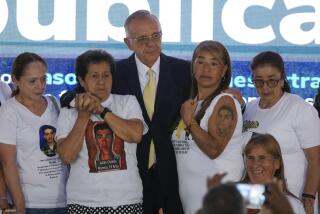Army Killed Thousands in ’47 Massacre, Taiwan Admits
- Share via
BEIJING — The Nationalist government in Taiwan has admitted that its army killed an estimated 18,000 to 28,000 native-born Taiwanese in a 1947 massacre.
The brutal killings, which have poisoned Taiwan’s politics for the past 45 years, were never a secret to the older generation of Taiwanese. But until publication this weekend of a 400,000-word official document, which was reported by the local media Sunday, the government never acknowledged the vast scale of the bloodshed.
Until martial law was lifted on the island five years ago, it was dangerous to discuss the massacre with anyone but relatives or trusted friends.
Most mainland Chinese who fled to the island with the Nationalist government in 1949--and who together with their children make up about 15% of the island’s population--have never really understood the horror of what happened before their arrival. But Taiwanese residents of the island, descended from immigrants who came from the China coast in previous centuries, could not forget it.
The result was permanent tension between the two groups, which has eased over the decades but still persists. Taiwan’s main opposition group, the Democratic Progressive Party, draws much of its strength from resentments that are related to the 1947 killings.
The report represents an attempt by the Nationalist government to finally put the long and painful controversy behind it.
The Nationalist action will also serve as a symbol to those in China who believe that someday a new Beijing government must reverse the official judgment on the 1989 massacre of pro-democracy protesters in Beijing. Western analysts generally estimate that about 1,000 people were killed in that incident, which the Communist government still calls a “counterrevolutionary rebellion.”
Taiwan’s Interior Minister Wu Poh-hsiung was quoted Sunday as declaring that the government is eager “to heal the wounds of history.” He said the government will consider making an official apology and might offer financial compensation to relatives of the victims.
Wu, who himself is a native-born Taiwanese, had an uncle who was killed in the massacre.
At the time of the killings, Taiwan was under the control of Nationalist troops and officials sent from the Chinese mainland by Chiang Kai-shek. The island had reverted to Chinese control at the end of World War II, after 50 years of Japanese occupation.
Chiang, who headed the Nationalist government in Nanjing (known at the time as Nanking), was engaged in a bitter civil war with the Communists. His forces in Taiwan were especially corrupt, and they provoked deep discontent with Nationalist rule.
The spark for the massacre came when officials from the government tobacco monopoly, backed by about a dozen police, confiscated the goods of a woman selling cigarettes privately. They clashed with angry bystanders and a man was killed.
The next day, Feb. 28, 1947, an angry crowd gathered in the streets of Taipei, and rioting erupted. Troops fired on the crowd. The rioting was ultimately suppressed, but the army followed up in subsequent days by arresting and executing people thought to be capable of leading resistance to Nationalist rule. Many of those who died were among the island’s better-educated residents.
The entire crackdown became known as the Feb. 28 Incident.
For more than four decades, the Nationalists insisted that the riots were instigated by the Chinese Communists and that crushing them had been an unavoidable episode in the civil war.
But the government report issued over the weekend acknowledged that corruption and misrule were fundamental causes for the rioting, and it criticized Chiang for failing to punish officials responsible for the killings.
Chiang “failed to think things over carefully . . . and left wounds that would not heal for a long time,” the report said.
While the more liberal leaders who now control the Nationalist Party are finally trying to heal those wounds, in the short run the report may fuel further controversy.
Democratic Progressive Party legislator Frank Hsieh has already announced that he will introduce a bill to provide compensation to families of those who were killed.
The only promise made so far by the government is to pay for a monument to the victims.
More to Read
Sign up for Essential California
The most important California stories and recommendations in your inbox every morning.
You may occasionally receive promotional content from the Los Angeles Times.













